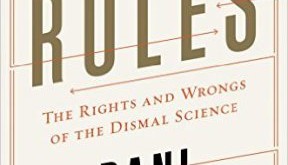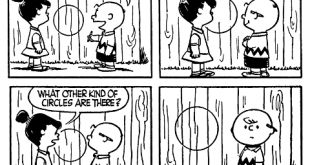Radikal? Ja! Neoklassiker? Nej! De flesta vetenskaper ägnar sig åt teoretiska förenklingar av något slag. Det tror jag inte någon ifrågasätter. Vad frågan gäller är vad för slags teoretiska förenklingar man jobbar med. Och just här är kontrasten mellan ekonomisk teori och till exempel fysiken frapperande. Där fysiken kan göra både materiella och ideella ”galileiska experiment” (om galileiska experiment kan man läsa i vetenskapsteoretikern Nancy Cartwrights Hunting Causes and Using Them:...
Read More »Dani Rodrik’s pseudo-pluralism (III)
Dani Rodrik’s pseudo-pluralism (III) In Dani Rodrik’s Economics Rules the proliferation of economic models during the last twenty-thirty years is presented as a sign of great diversity and abundance of new ideas: Rather than a single, specific model, economics encompasses a collection of models … Economics is in fact, a collection of diverse models that do not have a particular ideological bent or lead to a unique conclusion … The possibilities of social life are too diverse to be squeezed...
Read More »Nu krävs en expansiv finanspolitik
Nu krävs en expansiv finanspolitik Yours truly, Lars Ahnland och Rodney Edvinsson skrev häromdagen i Svenska Dagbladet om behovet av nytänk inom penningpolitiken. Hans Palmstierna och Martin Moraeus kommenterade ett par dagar senare artikeln. Igår skrev vi i vår slutreplik: Sverige befinner sig i dag i en situation som är obehagligt lik en likviditetsfälla. I en sådan blir penningpolitiken verkningslös eftersom företagen slutar att låna till investeringar och istället amorterar sina...
Read More »Dani Rodrik’s blind spot (II)
Dani Rodrik’s blind spot (II) As I argued in a previous post, Dani Rodrik’s Economics Rules describes economics as a more or less problem-free smorgasbord collection of models. Economics is portrayed as advancing through a judicious selection from a continually expanding library of models, models that are presented as “partial maps” or “simplifications designed to show how specific mechanisms work.” But one of the things that’s missing in Rodrik’s view of economic models is the...
Read More »Dani Rodrik’s smorgasbord view of economic models
Dani Rodrik’s smorgasbord view of economic models Traveling by train to Stockholm during the weekend, yours truly had plenty of time to catch up on some reading. Dani Rodrik’s Economics Rules (Oxford University Press, 2015) is one of those rare examples where a mainstream economist — instead of just looking the other way — takes his time to ponder on the tough and deep science-theoretic and methodological questions that underpin the economics discipline. There’s much in the book I like and...
Read More »Dags för synvända i statsskuldspolitiken
Yours truly och ekonomihistorikerna Lars Ahnland och Rodney Edvinsson hade i lördagens Svenska Dagbladet en artikel om behovet av en synvända i statskuldspolitiken: I normalfallet är det en risk att inflationen ökar om en stat finansierar sig genom att trycka pengar. Men i dag är högre inflationstakt inte ett hot, utan en välsignelse. Man kan likna inflationen i ekonomin vid blodomloppet hos en människa. Cirkulationen av pengar är det som håller den ekonomiska aktiviteten vid liv. Liksom...
Read More »The blatant absence of empirical fit of macroeconomic models
The blatant absence of empirical fit of macroeconomic models Some months ago sorta-kinda ‘New Keynesian’ Paul Krugman argued on his blog that the problem with the academic profession is that some macroeconomists aren’t “bothered to actually figure out” how the ‘New Keynesian’ model with its Euler conditions — “based on the assumption that people have perfect access to capital markets, so that they can borrow and lend at the same rate” — really works. According to Krugman, this shouldn’t be...
Read More »The law of demand — a useless tautology immunized against empirical facts
The law of demand — a useless tautology immunized against empirical facts Mainstream economics is usually considered to be very ‘rigorous’ and ‘precise.’ And yes, indeed, it’s certainly full of ‘rigorous’ and ‘precise’ statements like “the state of the economy will remain the same as long as it doesn’t change.” Although ‘true,’ this is however — as most other analytical statements — neither particularly interesting nor informative. For the sphere of consumption goods, the law of demand is...
Read More »The real limit of public debt
The real limit of public debt Everything we know is not just wrong – it’s backwards. When banks make loans, they create money. This is because money is really just an IOU. The role of the central bank is to preside over a legal order that effectively grants banks the exclusive right to create IOUs of a certain kind, ones that the government will recognise as legal tender by its willingness to accept them in payment of taxes … What this means is that the real limit on the amount of money...
Read More »Bravest of the brave
Bravest of the brave Edward Snowden and Daniel Ellsberg. Bravest of the brave. Never give in. Never give up. My friends — you bow to no one [embedded content]
Read More » Heterodox
Heterodox










